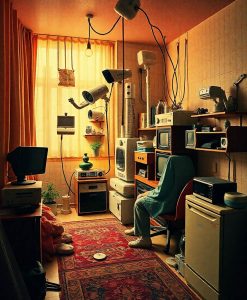Living in a home where every movement is watched can feel like walking through a fog of unseen eyes. For domestic workers, who often find themselves in intimate settings, the presence of smart home devices—cameras, voice assistants, motion sensors—can turn everyday moments into a watched performance. The sensation of being under perpetual surveillance is not just a feeling—it can profoundly impact mental wellbeing, creating a quiet, persistent sense of vulnerability.
Smart home technology has revolutionized how we manage our living spaces, offering convenience and efficiency at a tap on a screen. Yet, when these devices are used to monitor those who work within the home, it introduces complex emotional dynamics. Domestic workers may sense that their every move is being scrutinized, a feeling that can erode trust, foster anxiety, and diminish their sense of safety. It’s as if the home, meant to be a sanctuary, becomes a place of unending observation.
This constant feeling of being watched can be especially distressing for domestic workers, who often operate in environments where boundaries are fluid and privacy is limited. When home devices are used for surveillance—tracking footsteps, recording conversations, or even monitoring sleep—their presence can reinforce a sense of loss of control. Workers might worry about how their private moments are being recorded or used, leading to heightened stress and a sense of vulnerability.
Research indicates that these surveillance practices may unintentionally harm the mental health of domestic workers, who may already face systemic challenges and social isolation. The feeling that their employer is always watching can lead to heightened anxiety and a diminished sense of autonomy, making it harder to establish the boundaries that are essential for mental wellbeing.
The implications extend beyond individual workers. When the home becomes a space of constant observation, it can create a tense atmosphere that affects relationships and overall wellbeing. Workers might feel they have no escape from the gaze of surveillance devices, which can lead to emotional exhaustion and a sense of being devalued or dehumanized.
In a society where technology increasingly mediates our personal spaces, it’s essential to consider the human cost. Smart home devices have the potential to serve as tools for safety and efficiency, but their use in monitoring domestic workers demands careful reflection. Respecting privacy and fostering environments of trust can help protect the mental health of those who keep our homes running smoothly.
Understanding the emotional toll of surveillance in domestic settings invites us to rethink how technology is implemented. It’s about recognizing that the home should be a place of comfort, not constant scrutiny. For employers and policymakers alike, finding a balance between safety and privacy is essential to creating environments where domestic workers feel secure, respected, and valued.
How surveillance in smart homes impacts domestic workers’ mental health and safety
Living with the awareness that every move might be recorded or scrutinized can quietly wear down a person’s sense of safety and wellbeing. As smart home devices become more common in domestic environments, it’s crucial to understand the emotional consequences for those working behind the scenes. Respecting privacy while maintaining safety isn’t just a technical challenge—it’s a human one.

The silent power of constant monitoring can foster feelings of being devalued or underappreciated. Domestic workers often dedicate themselves fully to their roles, yet the presence of surveillance technology can make their work feel less like a trusted partnership and more like a performance under scrutiny. This shift can lead to stress, anxiety, and a diminished sense of control over their own lives.
When smart home devices are used to oversee workers, it’s not only about safety—it’s about dignity. The home should serve as a refuge, a place where trust and respect flourish. Recognizing the emotional toll of surveillance is the first step toward creating safer, more humane working environments. Employers can reflect on how to balance technological oversight with the fundamental rights to privacy and mental wellbeing.
For domestic workers, feeling safe and respected isn’t just a matter of physical security—it’s about emotional security. Knowing that their privacy is protected and that their work environment is respectful can make all the difference in their mental health and overall job satisfaction. As society continues to integrate smart technology into our homes, this awareness can guide us toward more compassionate, human-centered solutions.
Learn More: Smart home devices used to monitor domestic workers raise safety concerns
Abstract: The growing use of smart home devices is undermining the privacy and safety of domestic workers. New research reveals how surveillance technologies reinforce a sense of constant monitoring and control by domestic workers’ employers, increasing their vulnerability and impacting their mental wellbeing.
Link: Read Full Article (External Site)
